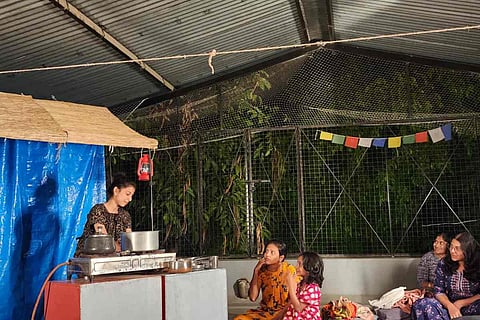

The aroma of freshly made tea and bajjis hit you as you walk into the set of the play Mobile Girls Koottam. These delicacies also make their way to the audience as the play progresses. The actors refer to the audience as pakathu veetu kaaranga (neighbours) and even invite them to help them with the chores. No clear distinction is made between the audience’s seats and the ‘stage’. Over the next 80 minutes, the characters take the audience through the various struggles faced by working women, the gendered politics of public space, labour politics, menstruation, religion, biriyani, and almost everything under the sun.
Directed by Sam PC, Mobile Girls Koottam revolves around the lives of four women – Satya, Abhinaya, Lakshmi, and Kalpana – who work in a factory that manufactures Nokia mobile phones. The play is based on the research undertaken by scholar Madumitta Dutta, whose PhD is on labour geography. The Nokia factory that was chosen for the study was located in Kancheepuram and had a total of 8000 employees, out of which nearly 6000 were women. The director would accompany the researcher to help with translation, which is how she met the four women on whom the play is based. While interacting with the audience, Sam PC revealed that the four women were involved in the writing process.
Through the conversations that play out between the characters (and with the audience occasionally), we hear about the women’s lives, their dreams and how they negotiate their newfound freedom that comes with its own set of conditions. For instance, Lakshmi is able to go to a tea shop after a long day of work, but a man at the tea shop ogles her as she was not wearing a shawl. Meanwhile, Sathya is able to walk freely through the streets at night, but feels unsafe when she notices a policeman on the street. This inspires her to want to become a police officer so that she can make the streets safer for women like her.
While the four women had to take up the job to support their families, and give up on their ambitions (like Abhinaya, who wanted to finish college), they did not let their dreams be curtailed by their immediate circumstances. When there are rumours about the imminent closure of their factory, the women seem hopeless for a few moments before they dream of opening their own tea shop that is open only to women, and eventually men, only if they are accompanied by women.
When the women engage in these conversations, the audience is also seamlessly involved. In a way, this holds the audience also accountable for not standing up against their oppression. While there are fleeting mentions of Bharathiyar, Periyar, and BR Ambedkar, the play could have delved a little deeper into the caste dynamics at play in their workplace and/or in their families.
The play does not answer all the questions raised by the women or offer solutions to their problems, but paves way for conversations that are often shied away from. While factory labourers are often treated as mere statistics either when they are hired or laid off, Mobile Girls Koottam sheds light on the nuanced lives these women lead and how their circumstances help them develop a strong sense of solidarity.